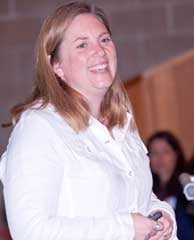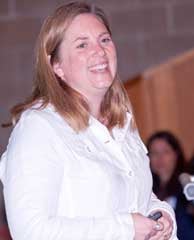 KINGSTON, R.I. – June 11, 2014 – It’s no secret educators, parents and politicians are worried that the nation’s public schools are failing to prepare students for a rapidly changing world.
KINGSTON, R.I. – June 11, 2014 – It’s no secret educators, parents and politicians are worried that the nation’s public schools are failing to prepare students for a rapidly changing world.
Help is on the way from the University of Rhode Island, where educators and scientists are working to train teachers how to teach science in a way that emphasizes critical analysis and hands-on learning.
The initiative by URI’s Guiding Education in Math and Science Network, or GEMS-Net, takes on greater importance following Rhode Island’s decision last year to adopt Next Generation Science Standards, new national guidelines for science teaching.
Rhode Island was the first state in the country to adopt the new standards. Some other states, like Texas, are unlikely to embrace the guidelines because they seek to teach students about controversial topics like climate change and evolution.
The URI group will be busy this summer, creating a new science curriculum that Rhode Island’s public schools can use if they want. The group will also hold a leadership training workshop in August for about 50 science teachers.
Currently, GEMS-Net is working with nine school districts in pre-kindergarten through 8th grade, at 43 schools. More than 630 teachers are expected to participate in the group’s professional development programs in the coming years.
Director Sara Sweetman is especially qualified to lead the charge. She is a former science teacher in Jamestown’s public schools, an assistant professor of education at URI and a science consultant for children’s programs at PBS, including Sesame Street.
We sat down with her to talk about her efforts, how URI’s education professors are improving science teaching in Rhode Island, and of course, what it’s like to hang out in Oscar’s trash can.
Why is it so important to overhaul science teaching in the country?
We can only imagine the challenges our society will have in 20 years when young students are beginning their careers. We will likely be living in new environments, fighting new diseases, enjoying new media platforms and harvesting our natural resources differently. The job opportunities in STEM (science, technology, engineering and math) fields are expected to increase dramatically in the coming years, and there is a need for people to be critical decision makers. It is important that schools challenge children to act, think and learn like scientists. In most American elementary schools science education has not been a priority.
Tell us about GEMS-Net? Why was it created? Who is funding the group?
URI educators and scientists partner with local school districts to build a support program that ensures all children have access to high quality STEM education. We provide districts with research-based, student-centered curriculum and materials and support all district educators with professional development. The majority of the funding comes from the districts through membership fees.
Your group is helping nine school districts. Would you like more schools to join?
Sure, more schools mean more shared resources. It helps us keep the costs to districts down – an important part of our partnership. In addition, more districts mean that more children will receive the learning opportunities to develop problem solving and critical thinking skills.
Gems-Net is writing a new science curriculum this summer for the state’s public schools to adopt if they want. Any details yet about what will be included in the curriculum?
Yes, we have sample documents to share. The curriculum has suggestions to teachers on methods of teaching, what research based materials to use, how to measure student success and how to capitalize on the connections to the Common Core Standards for Math and English Language Arts.
The Next Generation Science Standards, or NGSS, were developed by 26 state governments and a group of scientists and teachers. They provide guidelines for what students should learn, but allow school districts to decide on curriculums. When did Rhode Island adopt the guidelines?
Rhode Island was the first state to adopt the NGSS standards after they were released last May. The districts are expected to be aligned with the new standards by 2017. The policy tells the districts what they need to be doing, but it does not tell them how to do it. That is a great challenge for the districts.
Why are the new guidelines controversial in some states?
There are a few reasons why states might not adopt the standards. Not all states agree on the content, particularly in areas of climate change and evolution, but it is more than that. The NGSS is a policy document with high expectations that will be very challenging to implement. The transition will cost states and districts money and will likely add to schools already stressed as they work toward expectations on other policies. The demands are too great for districts to do alone. That is why the partnerships URI has with districts are essential.
It must be fulfilling to work as a science consultant for PBS? You appeared on Sesame Street several years ago. Did you have fun?
It is very rewarding. Everyone I have worked with at PBS is passionate about education. STEM education fits into their mission. It’s about kids, characters and Muppets discovering their world and falling in love with learning. PBS engages their characters in real problems with real solutions. It is a great model for all levels of learning.
Pictured above:
Sara Sweetman, director of URI’s Guiding Education in Math and Science Network, or GEMS-Net. She is also an assistant professor of education at URI and a former science teacher in Jamestown. Photo by Michael Salerno.

